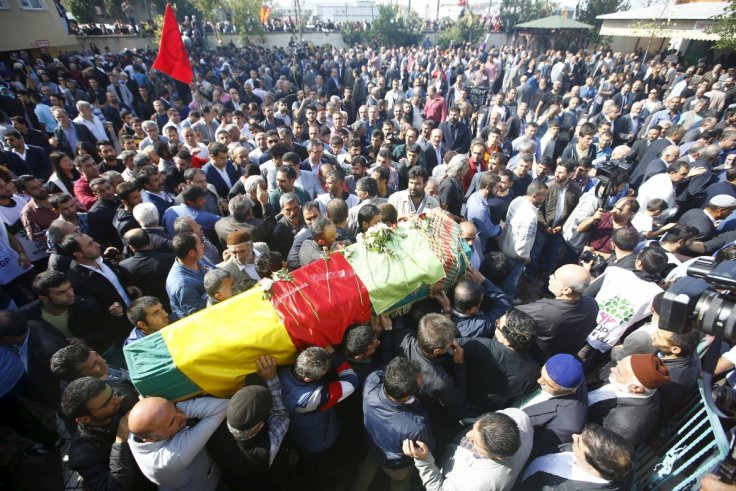For five months, there was a nationwide state of exception in Turkey. The Justice and Development Party (AKP) carried out a bloody electoral campaign. Under the label of “Anti-terror operations,” President Erdogan unleashed state-sponsored terrorism against the Kurdish movement and the left. Hundreds of people were murdered and thousands were imprisoned. Consequently, the AKP ensured that it will continue to govern on its own.
Will the assassinations stop now after the AKP’s electoral success? Will the confrontation of the government against the Kurds and the Left cease and calm return to Turkey? Will there finally be economic and political stability, as the capital hopes?
The political conditions in the region speak against this: Erdogan’s bellicosity and hostile external relations led the Turkish state into a geopolitical crisis, as evidenced by the facts that the “Turkish model” of moderate islamism and neoliberalism failed to succeed in Egypt and that Turkey isolated itself by backing Assad in the civil war. Now, Erdogan wants to make concessions to the imperialist powers in order to present himself as an “agent of stability” in the region. The first signals to this effect were the meeting with Merkel on the refugee crisis and the meeting with the US about the situation in Syria.
Internally, there is also very little to suspect that the government’s instability will decrease. Possibly, AKP-critical sectors of the Turkish bourgeoisie will advocate “peace” in order for the government to concentrate on economic “reforms,” because the Turkish economy is shrinking and Erdogan will try to overcome instability by harsh economic attacks. The first lay-offs are already happening.
The HDP’s role
The pro-Kurdish party HDP was especially affected by the state-organized assassinations of the last months. Hundreds of HDP offices were attacked, dozens of HDP activists were murdered at the massacres in Diyarbakir, Suruç and Ankara, and hundreds of Kurdish politicians were detained. Several Kurdish cities were put under siege by Turkish military and some military confrontations remain ongoing. Under the threat of further attacks, the HDP stopped its public electoral campaign and thus was unable to act under conditions equal to the other parties. Within that context, it is especially noteworthy that the Kurdish people reached a parliamentary representation anyway.
At the same time, it is important to emphasize that the HDP has limited itself to a purely observing role in the face of Erdogan’s course of increasing bonapartization. The HDP tries to present itself as a “trustworthy” party to end the “regime crisis”. However, this conciliatory role will only deepen the attacks on the workers by the government and the capitalists. The HDP abstained from mass mobilizations against Erdogan’s violence and limited itself to angry pronouncements. The non-existence of resistance was one condition for Erdogan’s ability to continue his murderous policy. After the Ankara massacre there was a two-day general strike, but in reality it was a funeral vigil.
In this period of offensive by the Turkish state, the HDP is turning right: The co-president of the HDP, Selahattin Demirtaş, argues that a coalition government would be the democratic solution, instead of an authoritarian one-party government. Before the elections, Demirtaş had already declared his willingness to discuss coalition options with the AKP and the CHP. Now, the bourgeois sectors of the HDP declare their desire to debate a new presidential system, which would grant Erdogan even more authoritative power.
But there is no resistance within the party against this conciliatory course because the representation of conservative and bourgeois sectors supposedly expresses the “democratic plurality of the party”. That ignores the fact that the interests of the bourgeois sectors amount to a renunciation of the interests of the workers. The willingness to debate the presidential system serves to legitimate Erdogan’s belligerent policies.
How to go on?
The elections are over. Erdogan will continue to rule the government. It is illusory to expect opposition from the conciliatory parties like the HDP, which are not wiling to raise demands for the class struggle. But the demoralization of the masses only serves Erdogan’s anti-worker and chauvinistic plans.
In contrast, the experience of the Gezi protests and of the workers’ struggles of the last few years show that Erdogan is very afraid of mass mobilizations and the organized class struggle. It is necessary to launch a broad campaign calling for the resignation of Erdogan and the new government, for the judicial conviction of the corrupt politicians, and for the independent investigation of the massacres. The answer to the authoritarian one-party government can’t be a coalition government but only the implementation of a free and sovereign constitutional assembly based on the mobilization of the masses.










